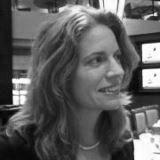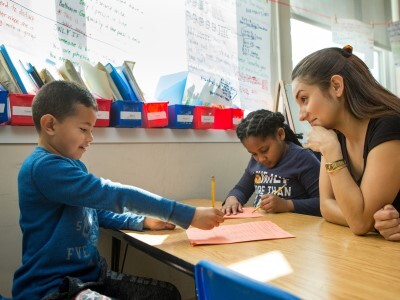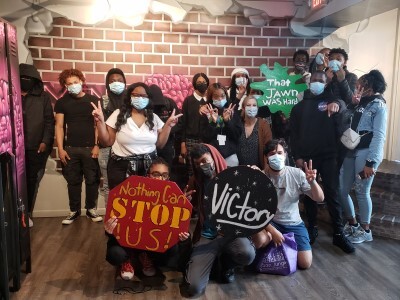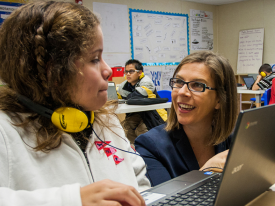Leading at the Intersection of Equity and Innovation in Education
Topics
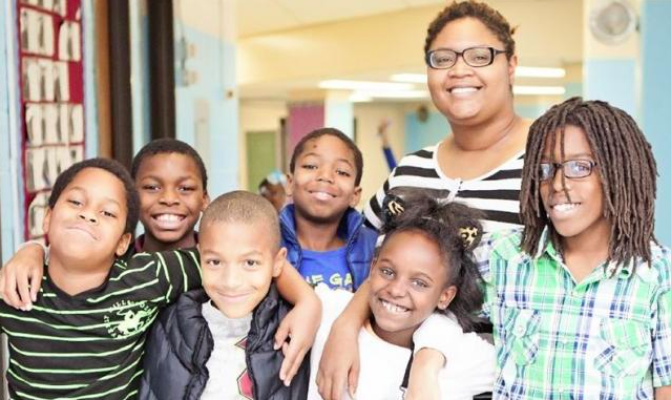
Together, educators are doing the reimagining and reinvention work necessary to make true educational equity possible. Student-centered learning advances equity when it values social and emotional growth alongside academic achievement, takes a cultural lens on strengths and competencies, and equips students with the power and skills to address injustice in their schools and communities.
Practitioner's Guide to Next Gen Learning
How we talk, our discourse, has an impact on equity in schools. Find resources to continue learning using a new discourse and active listening.
The team at CityBridge Foundation, an NGLC Regional Funds partner and ecosystem hub based in Washington, D.C., is skilled at many things. Providing immersive adult learning experiences and modeling engaged, reflective, and transformative learning are just two of them. That sounds like a compliment, but consider—as an extension of their commitment to learning—it may be something more. An expression of joy? Evidence of a belief in possibilities? A purposeful act of resistance?
The language and lens of these questions are not my own. They come from Changing the Discourse in Schools, a chapter in Race, Ethnicity, and Multiculturalism: Policy and Practice. CityBridge has made a deep commitment to learning that extends to learning as individuals, as an organization, and in, through, and with various communities. Here are three communities of practice at the nexus of their learning:
- Local teaching talent via the 54 alumni members of the Education Innovation Fellowship
- 13 school teams participating in Breakthrough Schools: D.C. in which teams reimagine a school’s vision, learning design, and operations
- 20 principals representing an inaugural leadership cohort made possible through a recent partnership with School Retool

For CityBridge, learning includes a new discourse, active listening, and choosing to inhabit the uncomfortable spaces. It is specifically equity-focused. In the convening of NGLC Regional Funds partners they co-hosted earlier this month, we were invited to read Changing the Discourse in Schools, a selected work used in the Education Innovation Fellowship curriculum and now considered seminal to the team’s emerging mindset and transformational approach. The essence of this text is that school is inherently inequitable, it serves to recreate social and economic inequities, and how we talk about changing school impacts what actually occurs. The authors ask us to reflect on how we go about changing the work in schools.
One of the tools the article offers is a side-by-side comparison chart of common Discourse I and Discourse II education terminology. The chart is especially useful for self-reflection. How do we talk about our work? Where do we focus our attention, energy, time and talent? Honestly, most of us at the convening found our work and language reflected some kind of mix—with some cherished efforts in one column and clear desires and attention also existing in the other.
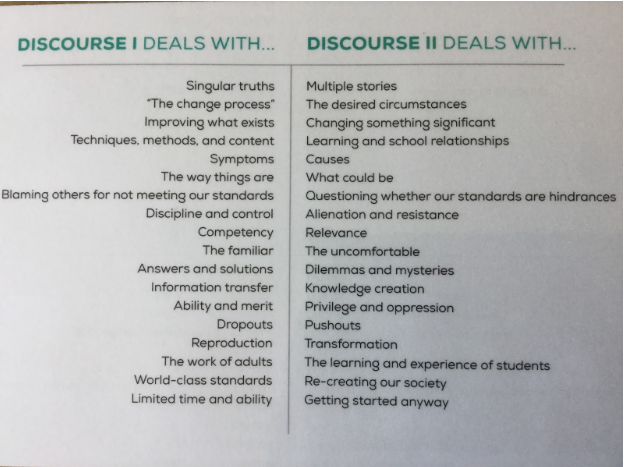
Quotes and mash-ups excerpted from the article lined the walls of our meeting room and beaconed a gallery walk interspersed with self-selected discussion groups.
As a group, we also wrestled with definitions of basic terms: institutional racism, oppression, dominant culture. I took note of the fact that my self-generated definition of anti-racist reflected the same spirit as the one provided but with one important exception. My definition failed to mention action. If I’m not (always) acting on my beliefs, can I still consider myself anti-racist?
… an anti-racist is a person committed to ongoing knowledge seeking, reflection, and action to deliberately oppose racism.
Self-reflection and wonderings echoed aloud as colleagues shared insights about their own sense of privilege and experience. A palpable feeling of self-consciousness filled the room. Despite that—or maybe because of it—colleagues reported feeling energized by the experience. Several partners expressed a desire to replicate it even when they may have already had similar in-house offerings. And, days later, I still find myself referring to my own laminated chart of Discourse I and Discourse II terminology.
According to the CityBridge team, the equity discussions emerged from the thoughtful inquiry of Education Innovation Fellows, their passion for the kids they work with, and the responsibilities these teachers feel to serve each child in ways that enable them to reach their fullest potential. I suspect a lot of teachers feel this way. And yet, many teachers also feel stuck, frustrated, and powerless—a cog in the wheel of a system that they may or may not realize they help to fuel.
Have you ever thought of time, or the lack of it, as an instrument of oppression? It’s often the reason we give for not getting started making needed changes, not doing something in a high-quality way, or not going deeper in order to get to root causes and significant change. Time can serve as a structural barrier that keeps us busy, exhausted, or churning. The authors of Changing the Discourse in Schools put it this way:;
“If we never have time to reflect, to consider, to question, then what prevails is how we do it now.” (p.9)
As a defining feature, “Discourse II schools create an organizational setting that is continually changing and developing because the members are continually learning.” (p.4) This is wisdom CityBridge has taken to heart and where they are currently demonstrating leadership. “We don’t have the answers,” they assure me. I get that the work is complicated, nuanced, and multifaceted. But through their experience, and their example, they’re proposing a richly textured set of questions for us:
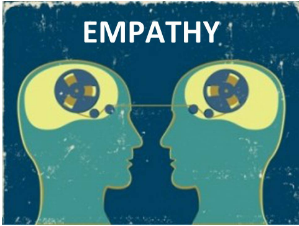
- Can you have empathy and relate to learners if you’re not a learner yourself?
- Is it possible to teach and inspire a learning mindset if you’re not nurturing and reflecting upon your own?
- How much can you grow if you’re not curious, exploring, making time, making mistakes, or making discoveries?
- If you’re not actively working against institutional systems of oppression, are you unwittingly working for or with them?
I’m inspired by CityBridge’s commitment to learning. It’s a courageous foray into the unknown. An act of faith in creating more equitable, meaningful, and relevant realities for students and all those connected to them… which of course, is all of us.
Resources
- Changing the Discourse in Schools. Excerpted from Race, Ethnicity and Multiculturalism Policy and Practice (Chapter 6) by Eugene Eubanks, Ralph Parish, and Dianne Smith
- Lesson Plan: Leading at the Intersection of Equity and Innovation, and Slides
- Nurturing Seeds of Equity in Next Generation School Design (blog)
- The National Equity Project (website)
- Text-based Discussion Protocol, Center for Collaborative Education
- Turning to One Another (book), by Margaret J. Wheatley (and these quotes)
- Learn more about NGLC Regional Funds: Getting Smart on Regional Next-Gen School Design
- Learn more about previous convenings of the NGLC Regional Funds partners: We Are All Learners: Professional Learning in Collaborative Networks

